Alejandro Reyes
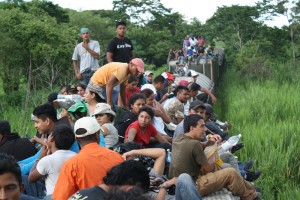 They call it the beast. Innumerable tons of creaky iron that creep from the border of Mexico and Guatemala toward the north. On it, clinging to the smoldering metal of the roofs of the wagons, dreams, hopes, tragedies, desires, and solitudes travel daily. It is the train of death, the migrant train, and the thousands of miles that it travels represent one of the most dangerous trips in the world. We climbed on the beast in Tenosique, Tabasco, near the border with the jungle region of Petén, in Guatemala: migrants, activists, journalists, and individuals in solidarity, who joined the Caravan Step by Step Toward Peace, an initiative of several organizations for the defense of migrants’ rights to give visibility to the violence they suffer in Mexico and demand a halt to the abuses.
They call it the beast. Innumerable tons of creaky iron that creep from the border of Mexico and Guatemala toward the north. On it, clinging to the smoldering metal of the roofs of the wagons, dreams, hopes, tragedies, desires, and solitudes travel daily. It is the train of death, the migrant train, and the thousands of miles that it travels represent one of the most dangerous trips in the world. We climbed on the beast in Tenosique, Tabasco, near the border with the jungle region of Petén, in Guatemala: migrants, activists, journalists, and individuals in solidarity, who joined the Caravan Step by Step Toward Peace, an initiative of several organizations for the defense of migrants’ rights to give visibility to the violence they suffer in Mexico and demand a halt to the abuses.
No description can encompass the maelstrom of feelings that come together at the moment of climbing up the ladders of the wagons carrying meager provisions and finding a place to settle among so many other migrants in similar yet different conditions. There are those who know the way, they have traveled it several times, they have been deported from various points in Mexico or the US, they have been assaulted, beaten, kidnapped, blackmailed. There are those who had never been to Mexico before and only know the train from hearing the terrible stories about it, its many dangers. Many know each other, they traveled together through parts of Honduras and all of Guatemala, some of them, the most fortunate, by bus, others, most of them, on foot. Two young men, almost teenagers, fled their neighborhood in the periphery of San Pedro Sula, threatened by organized crime, with the clothes they were wearing and no money. 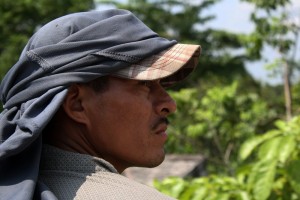 They walked through the wilderness for nine days, they got lost, they somehow managed to get to Tenosique, one of them with an ear infection from an insect bite, the other one limping with wounded feet and his shoes destroyed. Another one says he is the only one from a group of five who escaped from Mexican immigration officers, after having walked for two days to Tenosique. He and another man ran into a house, immigration officials cannot enter homes without a search warrant or permission from the residents, they did so anyway after a short hesitation, they detained his friend, he jumped out a window and hid in a pastureland, the old woman who lived in the house brought him food until the danger passed. A young man is disoriented, always quiet, away from the rest, he rarely speaks with anyone. He is one of the two survivors of a kidnapping, a large group was attacked by the Zetas, there were women and children, they, like other men and women, were raped, the two of them managed to escape, but no one has seen the other youth, who knows where he went. We see the young man stay behind at the abandoned station. Climb on!, people shout, but he only watches the train with empty eyes. Further ahead, a few miles away, two men come out of the jungle, they climb on the train a few wagons behind. The migrants become alert: they could be muggers. No, somebody knows them, he traveled with them near the border. They were five, only two of them remain. “Who knows how many days they’ve been without eating,” says the man who knows them. “They have no money.”
They walked through the wilderness for nine days, they got lost, they somehow managed to get to Tenosique, one of them with an ear infection from an insect bite, the other one limping with wounded feet and his shoes destroyed. Another one says he is the only one from a group of five who escaped from Mexican immigration officers, after having walked for two days to Tenosique. He and another man ran into a house, immigration officials cannot enter homes without a search warrant or permission from the residents, they did so anyway after a short hesitation, they detained his friend, he jumped out a window and hid in a pastureland, the old woman who lived in the house brought him food until the danger passed. A young man is disoriented, always quiet, away from the rest, he rarely speaks with anyone. He is one of the two survivors of a kidnapping, a large group was attacked by the Zetas, there were women and children, they, like other men and women, were raped, the two of them managed to escape, but no one has seen the other youth, who knows where he went. We see the young man stay behind at the abandoned station. Climb on!, people shout, but he only watches the train with empty eyes. Further ahead, a few miles away, two men come out of the jungle, they climb on the train a few wagons behind. The migrants become alert: they could be muggers. No, somebody knows them, he traveled with them near the border. They were five, only two of them remain. “Who knows how many days they’ve been without eating,” says the man who knows them. “They have no money.”
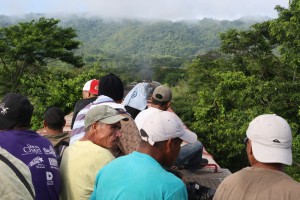 There’s a sensation of expectation, of joy, of fear. We are on the road, we’re on the beast. The views are breathtaking. Dense, voracious jungle, where suddenly appear minute villages with wooden homes with metal roofs, peasants that wave in solidarity, old women who smile from the doors, children who scream and laugh. Rivers, small lagoons, pasturelands, mountains, greenery everywhere. We go across a bridge, many stand up, open up their arms, laugh, a feeling of freedom, of movement, the limitless extension of nature lifts up the spirits and feeds hopes: we’ll make it, you’ll see, this time we’ll get there, God willing.
There’s a sensation of expectation, of joy, of fear. We are on the road, we’re on the beast. The views are breathtaking. Dense, voracious jungle, where suddenly appear minute villages with wooden homes with metal roofs, peasants that wave in solidarity, old women who smile from the doors, children who scream and laugh. Rivers, small lagoons, pasturelands, mountains, greenery everywhere. We go across a bridge, many stand up, open up their arms, laugh, a feeling of freedom, of movement, the limitless extension of nature lifts up the spirits and feeds hopes: we’ll make it, you’ll see, this time we’ll get there, God willing.
The sun intensifies, water is scarce, hardly anyone has eaten, a small group brought tortillas. No one complains. We try to protect ourselves from the sun any way we can, t-shirts and cloths on our heads like turbans. As we advance, friendships are woven, solidarities. It is a communion of yearnings and dangers, desires and fears. With this vertigo of emotions bonds are woven, stories are shared, people recognize themselves in each other. We are together, no one knows for how long, and it is precisely this uncertainty which perhaps most unites us. And solitude.
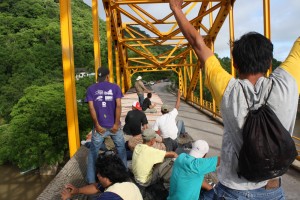 But there is a difference. This part of the trip is different, we all know it. The migrants thank their luck. “We missed the train on Sunday, when the migra chased us. But God knows why He does things. Otherwise, we wouldn’t be here.” The presence of journalists and activists brings them protection, though no guarantees—in a previous caravan, three armed men on a pickup truck tried to kidnap one of the women. In Palenque, an unexpected reception: a health team, two ambulances, bottles of water, rehydration packs, sanwiches and fruits. They’re facts, not words, says the government of Chiapas. As long as there are cameras. “Hmmmm, if you guys weren’t here, they’d be here to screw us,” comments with irony one of the migrants. “No more kidnappings!” he shouts at a group of policemen, enjoying the freedom to shout with impunity at those who incarnate terror.
But there is a difference. This part of the trip is different, we all know it. The migrants thank their luck. “We missed the train on Sunday, when the migra chased us. But God knows why He does things. Otherwise, we wouldn’t be here.” The presence of journalists and activists brings them protection, though no guarantees—in a previous caravan, three armed men on a pickup truck tried to kidnap one of the women. In Palenque, an unexpected reception: a health team, two ambulances, bottles of water, rehydration packs, sanwiches and fruits. They’re facts, not words, says the government of Chiapas. As long as there are cameras. “Hmmmm, if you guys weren’t here, they’d be here to screw us,” comments with irony one of the migrants. “No more kidnappings!” he shouts at a group of policemen, enjoying the freedom to shout with impunity at those who incarnate terror.
Still, no one is too confident. At an open field, under the burning sun of two in the afternoon, the train stops for no apparent reason. Immediately people become alert: “Why did it stop?” All of us try to make out enemies hidden among the trees, a hint of a truck parked across the tracks further ahead, some suspicious movement, ready to jump in case of danger, from a height of several yards, and to run like mad to save our necks. “They kidnapped me in Reynosa the fourth time I tried to make it,” says a man from Honduras who is now on his fifth attempt. “We were in Nuevas Aguas, several trucks arrived and they pointed their guns at us, they made us get in the trucks with blows and kicks. They took us to a house where they locked us up. They beat us. 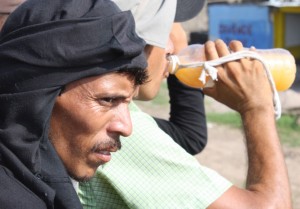 One by one they took us to a room alone, they told us to give them a phone number. I didn’t, and every time I said I didn’t have one, they beat me. When I managed to escape, I reached the migrant home in Reynosa and I had medical attention for a week. They want phone numbers so they can blackmail the family, they tell them to sell everything and send money, and sometimes they kill you even if your family sends money. But if you don’t give them a number, they beat you… I thought I was going to die, they took us to the river to kill us, we could barely move from being without food for so long. But thank God I had another chance to live, and here I go again.” Despite it all?, I ask. “Yes, here I go again, all for the good of my children.”
One by one they took us to a room alone, they told us to give them a phone number. I didn’t, and every time I said I didn’t have one, they beat me. When I managed to escape, I reached the migrant home in Reynosa and I had medical attention for a week. They want phone numbers so they can blackmail the family, they tell them to sell everything and send money, and sometimes they kill you even if your family sends money. But if you don’t give them a number, they beat you… I thought I was going to die, they took us to the river to kill us, we could barely move from being without food for so long. But thank God I had another chance to live, and here I go again.” Despite it all?, I ask. “Yes, here I go again, all for the good of my children.”
Organized crime discovered that migrants are a gold mine, “a very lucrative business, a dollar sign,” says Elvira Arellano, herself a former migrant, who in 2006 defied US laws when the ICE tried to deport her; she took refuge in a church in Chicago and became a migrant rights activist. A year later she was deported, but decided to continue struggling, now in her own country. She travels on the train and is one of the caravan’s coordinators.
At first, criminals—maras, Zetas, other criminal or drug trafficking groups—assaulted migrants to take the money they brought for the trip and to pay the coyote. Later they realized that it was much more lucrative to blackmail their families. And now, in the context of the war unleashed by president Felipe Calderón, migrants are kidnapped to serve as slaves to drug mafias, in particular the Zetas, especially in the state of Mexico and Veracruz, but in other states as well. They kidnap them, they train them, and they make them work, oftentimes as killers. Those who refuse are killed. Those who try to escape are killed. They burry them in common graves and nobody hears of them again.
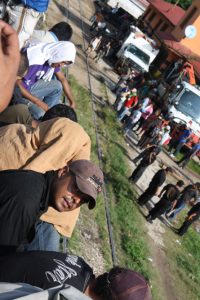 The complicity of members of all government institutions, and especially the National Migration Institute and the various police bodies, is well known. The impunity enjoyed by organized crime to kidnap, blackmail, torture, rape, enslave, and kill migrants is the main reason for the violence, which is oftentimes done with the connivance and active participation of police forces and immigration officers.
The complicity of members of all government institutions, and especially the National Migration Institute and the various police bodies, is well known. The impunity enjoyed by organized crime to kidnap, blackmail, torture, rape, enslave, and kill migrants is the main reason for the violence, which is oftentimes done with the connivance and active participation of police forces and immigration officers.
And the families? “Can you imagine what that means to the family” asks Mario, a Honduran migrant who climbed on the train in Palenque, and who travels with a fellow countryman who has lived in Texas and who promised to help him get a job if they manage to get there. “You leave and no one knows what will happen. Many people disappear and the family goes years without knowing what happened, if you’re in the US, if you were kidnapped, if you died. It’s awful living like that.” And what does your family think?, I ask Rigoberto, another Honduran migrant. “They don’t like it, it’s very hard to go without seeing each other for years, and they’re also very afraid of what may happen to me, you never know if you’ll ever come back.” Rigoberto was in the US four years, he was deported a month ago. What was it like to see your family again? “It was the best thing that ever happened to me. It was like a dream. I was with them for a month and now I’m on my way again. If I get there, I’ll stay for another four years.”
Almost everyone on the train is Honduran. And all of them say the same thing. There are no jobs, there is no money, crime is awful, we can’t go on living like that, our children deserve an opportunity in life. After the coup d’etat, the situation became unbearable. Economic power in the hands of a few, impunity and connivance between political power and organized crime turned the country into an inferno. Extorsion, violence, murder.
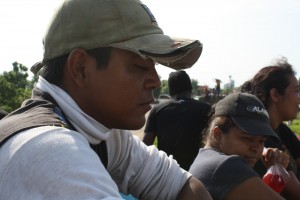 Two youths, brother and sister, travel together. They had never been outside Honduras, they have no money, they don’t know anyone in the US, they don’t know where they’re going nor where or how they intend to get across. They improvise, however things develop. They are friendly, smiling, suportive of others. They offer me a can of tuna fish. At night, we are next to each other. We all have to lie down, in the dark you can’t see the branches, which are dangerous and hit us in the face and body even when we lie down. There are many of us, there’s no room for us all, we’re literally on top of each other, bent in impossible positions. The three of us try to protect ourselves from the persistent rain with a single piece of plastic. Then, the cold. Some people don’t sleep, afraid of falling off the train. When the rain stops, a beautiful, starry sky appears, traversed by fleeting dark stains from the foliage that confirms our slow yet firm journey toward that north of hopes and chimeras.
Two youths, brother and sister, travel together. They had never been outside Honduras, they have no money, they don’t know anyone in the US, they don’t know where they’re going nor where or how they intend to get across. They improvise, however things develop. They are friendly, smiling, suportive of others. They offer me a can of tuna fish. At night, we are next to each other. We all have to lie down, in the dark you can’t see the branches, which are dangerous and hit us in the face and body even when we lie down. There are many of us, there’s no room for us all, we’re literally on top of each other, bent in impossible positions. The three of us try to protect ourselves from the persistent rain with a single piece of plastic. Then, the cold. Some people don’t sleep, afraid of falling off the train. When the rain stops, a beautiful, starry sky appears, traversed by fleeting dark stains from the foliage that confirms our slow yet firm journey toward that north of hopes and chimeras.
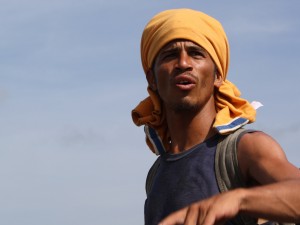 The morning is splendid and the rising sun helps loosen up the twisted bodies that begin to awaken. One more day of traveling, of heat, thirst and hunger, of stories and anecdotes, of dangers to overcome, of solitude circumvented by the intensity of the present and the fire of hope.
The morning is splendid and the rising sun helps loosen up the twisted bodies that begin to awaken. One more day of traveling, of heat, thirst and hunger, of stories and anecdotes, of dangers to overcome, of solitude circumvented by the intensity of the present and the fire of hope.
That afternoon we say our goodbyes. In each handshake and each hug, an enigma. What will happen to you, brother, sister? In the unstoppable current of this flow of dreams and hopes toward the utopia of the north, men and women meet and part, they see each other in solidarity, they love, they lose each other, victims of a crushing and excluding system, the very embodiments of forlornness, but also of resistance, of perseverance, living examples of the human potential to continue struggling for a life with dignity with all odds against them.














